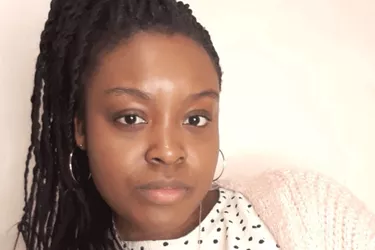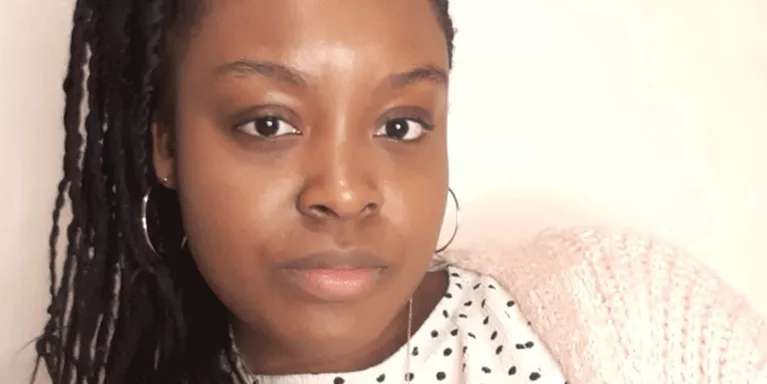Black women like me are told we’re ‘angry’
Ruth blogs about the racism she has faced when seeking support for her mental health.
As a young Black woman, I am very familiar with the general concept of mental health. However, I am also very familiar with the fact that it is not something discussed enough in Black families. I am no stranger to the fact that mental health challenges in both Black and Asian households are regularly swept under the carpet and that there is stigma attached to struggling with one’s own mental health.
But there is another huge problem – the struggles that young Black people like myself face when it comes to seeking help with our mental health. Much of this is due to the microaggressions we face in society today.
If a Black woman is shown to be happy and confident, she is labelled as a “strong Black woman”
There are so many labels that are given to Black men and women today due to systemic racism. Black men are often labelled as ‘tough’, ‘dangerous’, ‘angry’, ‘aggressive’ and ‘criminal’ in the media. Likewise, Black women are frequently labelled as ‘angry’, ‘loud’, ‘sassy’ and ‘promiscuous’. Due to these negative stereotypes that Black women face, if a Black woman is shown to be happy and confident, she is labelled as a ‘strong Black woman’ or an ‘independent Black woman’.
As a result of these stereotypes I myself have experienced more difficulties around opening up about my mental health struggles. Some individuals I opened up to at the time were clearly not used to seeing a Black person being so vulnerable. When I opened up to both Black and non-Black friends I received a mixed response.
Made to feel I was the problem
I was often made to feel as if I was the problem and told that I needed to control my anger when I was simply just trying to address how I was feeling. I was also told to attend more religious activities and to keep being strong in my faith. These responses were not only invalidating in terms of how I was feeling but were also unhelpful for me in the long-run when it came to seeking support for my mental health struggles.
I was struggling with anxiety and stress-related issues. Going to a new school, making friends, having problems at home and being bullied can make any young person brim with anxiety. However, for me personally, I believe that the root cause of my anxiety and stress was racism. This was further exacerbated by experiencing microaggressions at school and university.
I was shy and introverted until around the age of twelve. During my experience of primary and secondary school. I vividly remember White teachers at school accusing Black pupils like myself of being troublemakers, even when we had done nothing wrong. I was accused of being a bully by some White teachers and students because I seemed ‘angry’ and ‘rude’ when I was simply stressed or tired.
Despite being picked on by several classmates from an early age, I was the one labelled as the ‘troublemaker’ by White students and teachers alike. This caused me to develop trust issues towards authority figures as I felt like I had been not listened to by the very people who were supposed to help and protect me. This inability to trust others continued as I got older. Despite growing out of my shell and being quietly confident in my teens, the microaggressions I faced at school caused my anxiety to worsen. There was a clear divide throughout my time at school in terms of how I was perceived by some White teachers and some Black teachers. If I performed well in an exam, I would be praised and encouraged by a Black teacher while a White teacher would react with shock and bewilderment.
The latter reaction caused me to become more stressed, sometimes to the point where I would forget to eat or breathe. I felt as if I had to work even harder to be acknowledged as a good student. Eventually, my anxiety spiralled into fainting episodes, psychosis and eating problems which I experienced before and during my time at university. Fortunately, I now believe I have healed from most of the racism and microaggressions I experienced as a child and as a teenager. I am now a more confident, sociable and driven person who is able to manage my anxiety. Because of my past experiences with racism, these days I feel compelled to speak up whenever I am slighted and call out anyone who is racist towards me, including those in authority.
I have since developed compassion for those who do not fully understand my experiences and the microaggressions and stigma I have faced. I realise that not everybody has access and awareness to mental health as a general concept and not everybody is fully educated on the issue of systemic racism because it is so ingrained in our society. I am also now in a better place mentally and emotionally because I have found ways to cope with some of the hardships I have experienced as a woman of colour with my mental health.
Healing from the trauma
I have got myself a Black therapist who understands the hardships that Black people go through on a day-to-day basis. I attend a YPOC (Young People of Colour) group who offer social and emotional support and talk openly about their experiences of race and mental health and write my own blog titled The Essence of Being Me where I talk about how I healed from the trauma I experienced growing up as a Black person.
I also talk to Black and White friends who understand the struggles and are willing to educate themselves about systemic racism and write songs as a form of release to transform my experiences into something beautiful.
I can control how to take my power back by surrounding myself with people that I love.
I have realised that I cannot control what is going on in the world and how everybody thinks about mental health issues. But I can control how to take my power back by surrounding myself with people I love and by using my talents to address issues that matter to me in an assertive and beautiful manner.


Information and support
When you’re living with a mental health problem, or supporting someone who is, having access to the right information - about a condition, treatment options, or practical issues - is vital. Visit our information pages to find out more.
Share your story with others
Blogs and stories can show that people with mental health problems are cared about, understood and listened to. We can use it to challenge the status quo and change attitudes.















